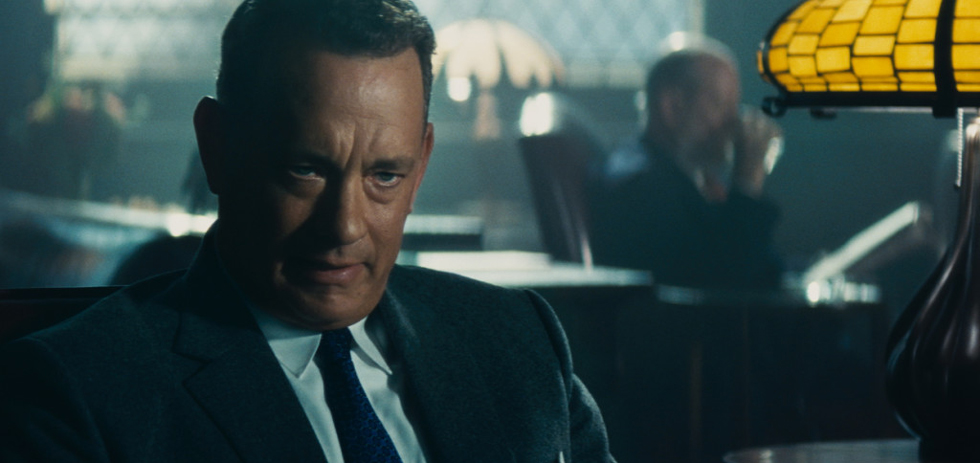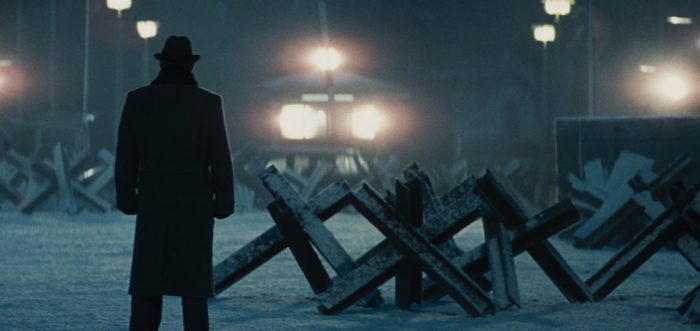
It’s been historically easy for critics to dismiss Steven Spielberg as a skilled populist devoid of moral complexity (as though mass entertainment was inherently a bad thing), thereby running the risk of dismissing his earlier blockbuster cinema in favour of frantic “mature phase” reappraisal. Yet the director’s new Bridge of Spies offers further proof—if ever it were needed—that Spielberg has always been one of the finest chroniclers of a certain brand of anxious American idealism, a master of refracting the national psyche through the lens of how it wants itself to be seen. It also locates the sweet spot for so much (superficially) disparate recent Spielberg: morally engaged and reflective, yet playful and funny and loose—and with a formal beauty that should end any doubts as to whether or not he’s one of American cinema’s greatest mainstream artists.
Opening in 1957—the same year as Spielberg’s other Cold War dad pic, Indiana Jones and the Kingdom of the Crystal Skull—Spies indulges in an elegantly muted establishing scene that sets the tone for much of this low-key, clockwork-tense thriller. In a Brooklyn apartment, solitary KGB agent Rudolf Abel (Mark Rylance) regards himself in a mirror, strobed by Janusz Kaminski’s strategic daylight before the camera pulls back to reveal he’s painting his self-portrait. It’s a simple sequence evoking both Abel’s eccentric character and the isolation of foreign agent life, all detailed with wordless precision. Moments later, he’s brought in by the feds for questioning and put on national trial as an alleged spy; here, we meet the film’s nominal hero James Donovan (Tom Hanks), an insurance lawyer who reluctantly agrees to defend Abel—much to the disgust of a nation hell-bent on stamping out the red menace.
An endearing friendship between Donovan and Abel, two pawns at varying degrees of their government’s mercy, forms the emotional core of Spielberg’s film. After an American spy pilot is shot down and captured by East Germans, Abel becomes currency in negotiations that draw out the worst in duplicitous power posturing of three nations, and Donovan is dispatched to Berlin to leverage his freedom. The film’s patient first act moves from the golden-hued courtrooms of Washington, D.C. to the chilly frost of early-‘60s Berlin, a city in the throes of cruel demarcation as the in-construction Wall seals off compatriots with arbitrary indifference.1 In such a political climate, Donovan, Abel, and the young American pilot are less humans than playing chips for their governments. “We’re just the little men,” Donovan says to Abel. “We need to get off this merry-go-round.”
There’s a breathless confidence to Spielberg’s storytelling here that’s wholly enveloping. As a filmmaker, he’s adjusted his more forceful tendencies to a gentle, almost soothing rhythm in Spies, trusting his audience’s complicity and in no hurry to hammer home grand points or dramatic moments. Perhaps all those years of caffeine abstinence are finally paying off. In Hanks—a national treasure if ever there was one—he’s reunited with an invaluable collaborator on the journey. Hanks is one of the few remaining movie stars capable of conveying that heady mix of American individualism and naïve idealism, while conjuring a Jimmy Stewart strand of skeptical patriotism without tipping over into sentimental excess. Perhaps inspired by co-writers Joel and Ethan Coen, Spielberg’s characters often exhibit a weary, deadpan take on potential world war scenarios that’s frequently very funny—best embodied by Rylance’s bemused (and amusing) performance as a man whose attitude toward international intrigue amounts to an absurd shrug.

For all its adult composition, Bridge of Spies also interfaces richly with Spielberg’s back catalogue; as singular a body of work as any in post-New Hollywood American cinema. Spielberg was 11-years-old in 1957, around the age he would have been yanked out of bed by his dad to watch UFOs in the middle of the night, or perhaps enjoyed attending matinees of those gross-out bugs-and-snakes adventures he’d conjure in his halcyon ‘80s period. Curiously, ‘mature’ Spielberg has now returned to this timeframe twice in his recent work, and on both occasions through decidedly fatherly eyes. An enjoyable mid-film sequence, showing Hanks’ son at school during an atomic-age ‘duck and cover’ classroom clip, practically plays as the director’s cheeky response to Kevin B. Lee’s “Spielberg Face” video essay: a classic sequence of wide-eyed fear and wonderment that could only be bettered had the lesson included a “nuke the fridge” survival tip.
Indeed, there’s a wonderful confluence between Bridge and Crystal Skull—specifically Spielberg’s undiminished taste for abstracted, Boys’ Own historicism—that make the two films surprising companions. While Jones moves at a comic-book clip, it’d be too easy to consider one the ‘dumb’ worldview of the other; as in the best late Spielberg, there’s a degree of moral ambiguity to his characters. Hanks’s Donovan, like Indiana Jones, is an American idealist fighting for the noble individual in a world being swallowed up by faceless, foolhardy governments. It’s compelling to watch the thread develop—and in such curious tandem. Here, too, as in Crystal Skull, it feels like Spielberg is reconciling his much-discussed absent father theme: an early visual motif depicts Hanks’s dad isolated in the frame (per Close Encounters), but concedes to a later shot which restores some empathy to his exhausted patriarch.
Just as Spielberg’s blockbuster cycle was more complex and subversive than many critics are willing to credit it for, his later run of prestige films percolate with an undertow of fascinating unease. Granted the director’s worldview remains largely benign, but there’s a willingness on Spielberg’s part to at least engage with a gentle interrogation of the American character, in examining how the nation’s individualist self played uncomfortably with its ascendancy as the Cold War’s primary power. Staunchly unaffiliated with his government, Hanks is the avatar for contemporary America, a lone moralist in the tradition of isolationists turned reluctant heroes.
Though the film sometimes strays toward the self-satisfied worldview of Americans who like to see themselves as independent brokers of peace, it’s not without considerable soul searching. Bridge of Spies reasserts the American belief in the essential goodness of the individual, especially when his government—and the governments of others—may not be trusted. “It doesn’t matter what people think of you,” Donovan insists toward the end of the film, having been both vilified and lauded for his actions. “You know what you did.” Dreamy idealism to be sure, but in the right hands—and they don’t get any more assured than Spielberg’s—it’s almost something worth subscribing to.
Around the Staff:
| Dominic Barlow |
